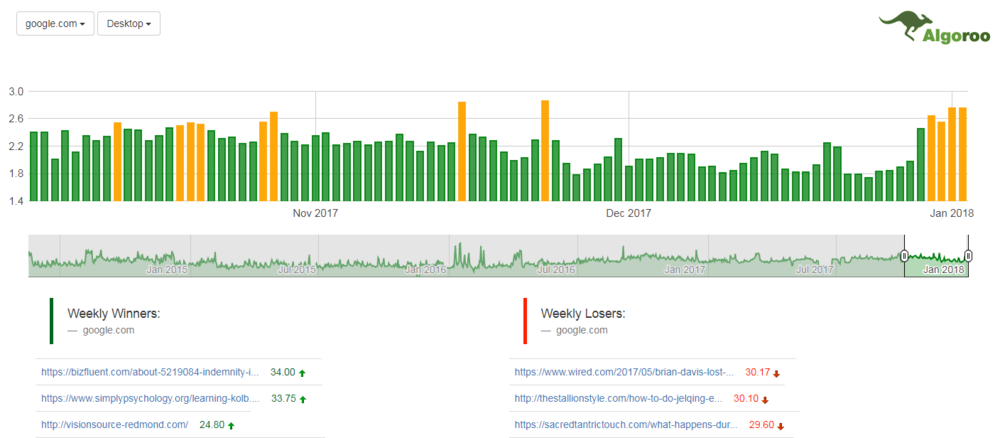The Complete Guide to Monitoring Google Algorithm Changes
Before we begin…
What is a Search Engine Algorithm?
A search algorithm analyzes what you are looking for and determines what information to return to you. The reason Google search gets increasingly intuitive and accurate is that Google staff is constantly working on improving its search algorithms.
Through work with algorithms, Google is able to determine the difference, for example, between Orange the telecommunications firm, the fruit, and the color. It’s how it determines whether you are searching for George Bush senior or George Bush junior. It’s how it can interpret what you’ve mistyped and still provide accurate results.
Google algorithms get more sophisticated because people are changing and so are their needs. Google and other search engines must adapt to people’s changing lifestyles and demands to serve them better.
For most businesses, their websites should be changing too.
New social media platforms are being created all the time. And how they work and how they are used changes over time. Mobile technology has changed the way people interact with the web. Google aims to not only keep up but stay ahead. How are you reacting to the changing environment in which your business exists?
Why You Should Monitor Algorithm Changes and the Tools for the Job
In 2014, Google’s (~500) algorithmic changes caused many sites to lose their rankings. Here is a full list of Google’s Algorithm changes since the beginning of Google.
If you find yourself on the wrong side of Google, you could lose significant traffic overnight. Worse, if you are relying almost entirely on Google traffic, you could go out of business.
Google provides a lot of help for business owners, who can have their sites designed with Google’s webmaster and search evaluator guidelines in mind, but over-reliance on internet traffic from one source - and a lack of attention to what Google is doing in its lab - can spell disaster.
Fortunately, we have a list of tools that will help you stay up-to-date so that you can keep benefiting from Google’s dominant position in search.
MozCast
The MozCast is a great way to see how Google’s algorithms have changed recently. We all understand the weather report. The MozCast displays Google’s activity in a similar style. Hot, stormy weather signifies significant changes.
It’s great for an overview, but it also provides more detailed information. You can view over 30-90 days, with useful visual representations.
SemRush Sensor
Like the MozCast, SemRush’s Sensor provides a fast way to see the severity of the day’s Google algorithm changes.
One of the things that differentiates this from MozCast is that it allows you to see the results broken down into categories, such as Finance, Business, news, and shopping. By registering or logging in, you can also see the score for your own domain.
SemRush provides more data than MozCast, with a useful “winner & losers” list of the most-affected domains daily, and “deviations” showing which categories have been experiencing disruption due to Google’s algorithm changes.
SERPMetrics Flux
This checker displays the volatility of algorithm changes over the last month. If you want your information fast, this checker will give you what you need at a glance.
Algoroo
Another easy-to-use checker, Algoroo displays a convenient bar graph indicating recent SERP changes. This system "monitors roughly 17,000 keywords to 100 search positions deep and looks for fluctuations."
AccuRanker Grump
This site uses a “grump” rating to display algorithmic activity. The more grumpy Google is, the more has changed.
The site uses a unique algorithm to measure 30,000 randomly selected keywords, split equally between mobile and desktop.
Rank Ranger's Rank Risk Index
This is not a bad checker, monitoring 10,000+ domains and keywords daily. It’s also a good place to get a Google algorithm history lesson, and news on the changes and what they mean.
Advanced Web Ranking
This site provides users with a customizable chart, so it’s easy to learn the information you need about Google’s algorithm changes.
Compare With Your Own Google Analytics Data
Now that we understand more about Google algorithms, we can get deeper insight by comparing your own Google Analytics data with Google changes. By doing this, you’ll learn more about how Google’s changes may or may not have affected your website.
Here are some handy tools to help you.
The Panguin Tool, developed by digital marketing firm Barracuda, helps you to compare your Google Analytics data to Google Updates. They provide plenty of help on their website, and you can get started for free, very quickly.
Annotations in Google Analytics
Add annotations in Google Analytics to note changes you make to the website. This is a great way of tracking your activity and seeing if changes to the website affect your ranking.
You can also add annotations when Google changes happen. This will give you further insight into the reason for changes to your website’s performance.
Review Google Change History
These websites keep note of significant Google changes so that you don’t have to.
Using this site is a great way to stay up to date with the major changes. Moz says that Google changes its algorithm between 500 and 600 times per year, but this page will tell you about those major changes that caused waves for search marketers.
Rankwatch provides you with a particularly stylish Google timeline. If you’re finding algorithmic changes dry but necessary, this site will make things a bit more lively for you. If it helps you plan your search marketing activities (which it will) with accurate information (which it has) then that’s what counts.
RankRanger – Google Algorithm Updates
We mentioned RankRanger’s Google history page earlier. Here it is again as a solid, informative way to learn about Google’s past algorithm changes and get some detailed analysis and news about those changes. Use this information to inform your current marketing activities.
Get the Latest Google Algorithm News
It’s one thing to keep an eye on past events. If we know anything about digital marketing, however, we know that it’s also important to keep an eye on the future and to watch news and trends.
The world of Google algorithms is no different. Fortunately, there are helpful guides to help you keep up-to-date with changes, predicted updates, and what it all means for businesses.
Check out our selection of the best Google algorithm news.
Search Engine Land – Google Algorithm Updates
This is a wonderful resource. As well links to dedicated information on individual algorithm updates, there is also plenty of current news. It’s a great idea to add this to your weekly reading. Anticipate changes that may affect your business and respond accordingly.
Search Engine Watch – Google Algorithm Updates
As you would expect from a site named Search Engine Watch, this site provides ample news regarding Google’s updates.
Search Engine Round Table – Google Updates
With Search Engine Round Table, you needn’t worry that you are going to miss news of a big update. You’ll find plenty of commentary and analysis here so you can ensure that you are informed and that your business is prepared.
This site is a little different to those listed above. It digs into Google patents and theorizes how that can affect search and businesses online.
“While the patent is often filled with legal language, it’s also often filled with assumptions about the Web, about search, and about searchers.”
The site was founded by Bill Slawski, who has been working with SEO and internet marketing consulting since 1996. Seeing how he formulates theories based on patent activity may help you become more critical when you spot Google algorithm changes.
Conclusion
Google is continually altering its search algorithms. Whether you realize it or not, major and minor algorithmic changes affect how people come into contact with your web presence.
By engaging with Google’s ‘behind the scenes’ activity, you have an opportunity to be proactive, instigating changes that will not only help you maintain your Google ranking, but boost it. Appropriate, timely action can put you way ahead of the competition.
It’s never too late to improve your website. In the past, that has meant taking action including paying extra attention to your use of pop-up ads, removing duplicate content, and ensuring that you are mobile ready. There will always be new ways to get ahead of the competition. Check out Google’s coming algorithm changes and use the information to your advantage.
Understanding Google’s changes also ensures that you don’t waste time thinking that something is wrong with your web design or marketing, when in fact the cause of a fluctuation was an algorithm change. You can use the information provided by Google algorithm trackers to show the difference between how Google affected your ranking and how your actions affected your ranking.
When a single change can wipe out traffic overnight, monitoring Google algorithm changes may be vital to maintaining your website search presence. Better yet, doing so can help you grow your business.










